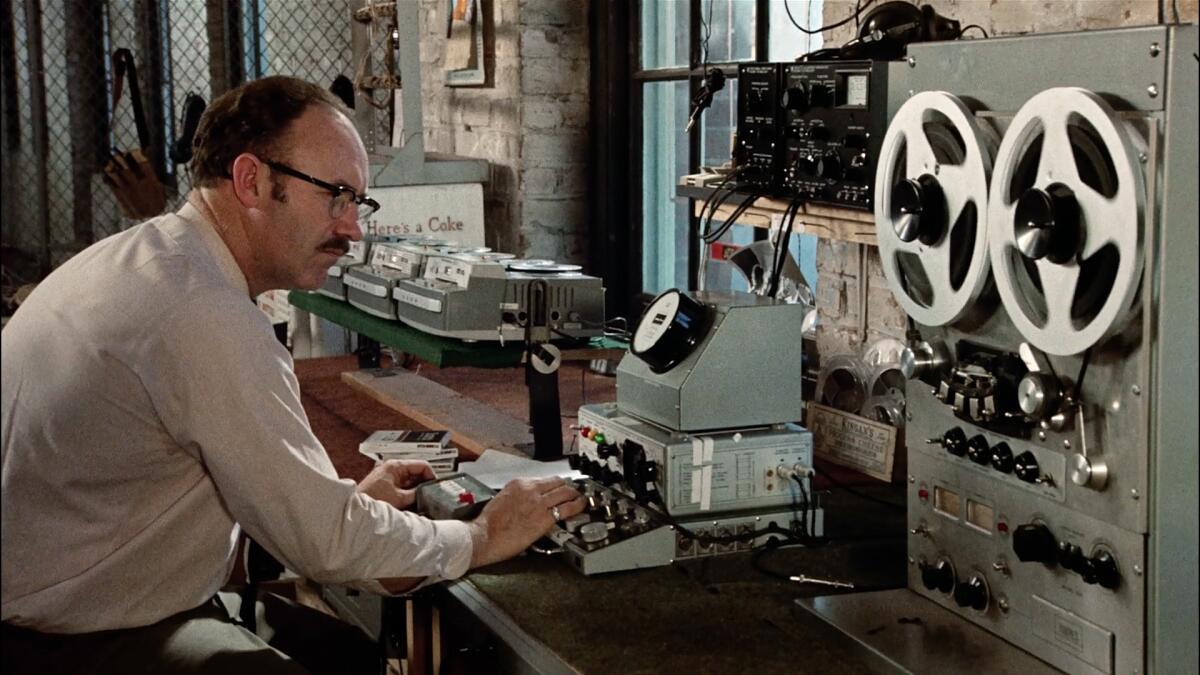Review: Gene Hackman is listening and 1974’s ‘The Conversation’ is more relevant than ever

The Times is committed to reviewing theatrical film releases during the COVID-19 pandemic. Because moviegoing carries risks during this time, we remind readers to follow health and safety guidelines as outlined by the Centers for Disease Control and Prevention and local health officials.
Celebrated in its time yet ahead of it, powerfully entertaining as well as prescient, Francis Ford Coppola’s writing and directing triumph “The Conversation” is back in town as disturbing and unnerving as ever, if not more so.
Starring Gene Hackman in one of his signature roles, this 1974 film did not lack for accolades back in the day, winning the Palme d’Or at Cannes and getting nominated for three Oscars, including best picture (the award went to that other Coppola film, “The Godfather, Part II.”) Not only is “Conversation” back for a full week run at Landmark’s Nuart in West Los Angeles, it is being screened in a newly struck 35 mm print, which means the marvelous grain and texture of Bill Butler’s edgy cinematography is on full display.
Also much to be admired is Walter Murch’s legendary sound design and an unsettling score by David Shire that resulted from Coppola giving the composer the script to read long before the film was shot.
But the heart of “The Conversation’s” appeal, then and now, is the way it combines an exceptional character study, a thriller plot and an ability to superbly convey the unease of a society where blanket surveillance is getting to be the norm.
Harry Caul, impeccably played by Hackman with a fine combination of technique and intuitive feeling, looks like the most ordinary of men as he schlumps around San Francisco, his translucent raincoat flapping in the wind, but he is anything but.
Brilliant, obsessive, deeply religious and possibly damaged, Harry is a master of surveillance technology, a legend his competitors call “the best bar none.”
Awkward and enigmatic in person, Harry goes to great pains to avoid human interaction. His apartment is guarded by three locks and an alarm system, he has no home phone anybody knows about, and his most revealingly personal moments come when he takes out his saxophone and plays along with jazz records.
Harry has managed to maintain a sort of relationship with the insecure Amy (a tip-top Teri Garr) but though he insists to her that “I don’t have any secrets,” when she innocently asks him ordinary questions he gets completely unnerved.
On the job, however, Harry is focused and unstoppable, and “The Conversation” opens in San Francisco’s Union Square, where young couple Ann (Cindy Williams) and Mark (Frederic Forrest) are wandering among the mimes and the homeless people (another unexpectedly contemporary touch) having what appears to be the most innocuous of conversations.
But if their conversation is so innocent why, as we gradually become aware, are Harry, his top assistant Stan (John Cazale, jittery as always) and an entire team of surveillance technicians using the most up-to-date technology to record their every word.
Stan is curious about that, but not Harry, at least not initially. Harry didn’t get to the top of the heap by being curious, and sound quality, he insists, is the only thing that matters to him.
But as we watch and listen to Harry painstakingly forcing the tapes he’s made to give up their secrets, he almost against his will starts to have his doubts, to break his first law and feel a sense of personal interest.
Though the officious Martin Stett (Harrison Ford in his last pre-“Star Wars” big screen role) warns him “don’t get involved with this,” Harry can’t help himself. He starts to fear that he has gotten in over his head. Whether he has, whether he even has any idea of what being in over his head means, is what “The Conversation” gradually reveals.
Character is obviously key to “The Conversation’s” success, with, in addition to those mentioned, Allen Garfield being especially good as Bernie Moran, a fellow surveillance expert and Harry’s bête noir.
Harry may use reel-to-reel tape, but it is finally in its portrayal of a world where everyone is listening all the time that “The Conversation” truly feels both timeless and of the moment. The consequences of that world for the surveillant as well as the surveilled is a lesson for this day and age for sure.
'The Conversation'
Rated: PG
Running time: 1 hour 53 minutes
Playing: Starts Jan. 28, Landmark Nuart, West Los Angeles
More to Read
Only good movies
Get the Indie Focus newsletter, Mark Olsen's weekly guide to the world of cinema.
You may occasionally receive promotional content from the Los Angeles Times.







